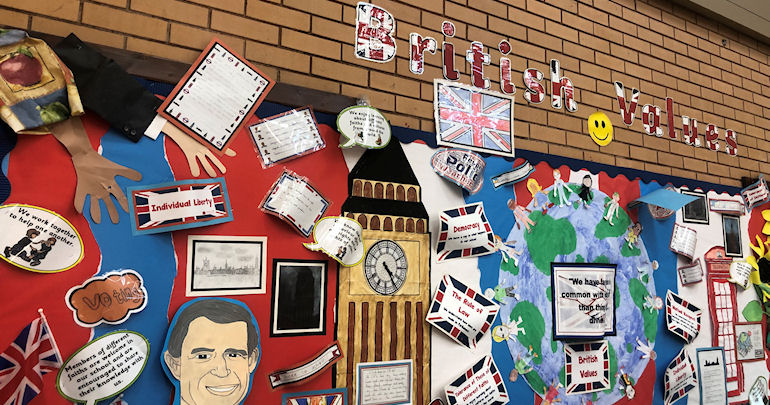Vision and Values
Our School Motto
'We walk by faith and not by sight'
2 Corinthians 5:7
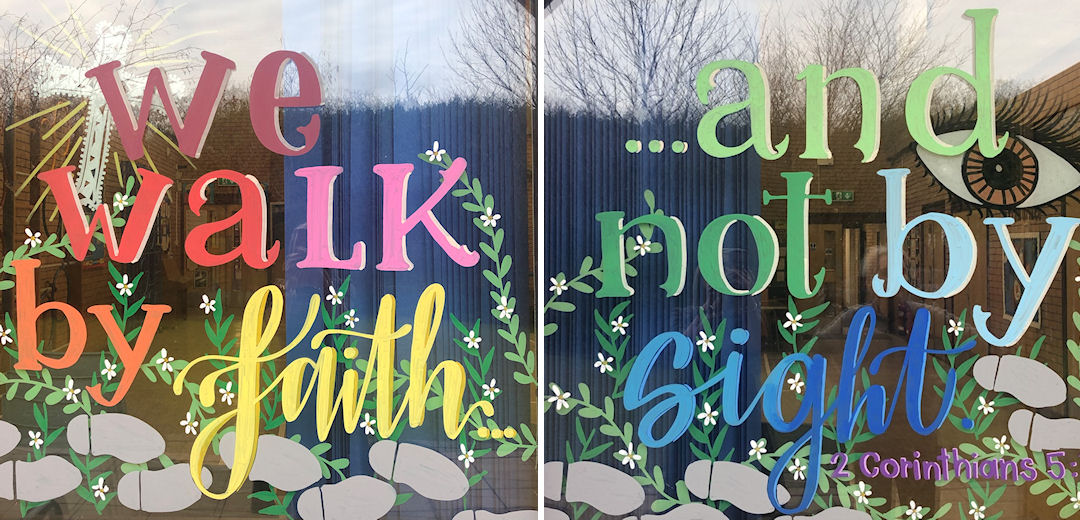
Our School Vision
At St. Paul’s we walk by faith and not by sight guided by the love of Jesus Christ.
Our vision is to be a school inspired by the life and teachings of Jesus so that all children and adults reach their full God given potential.
Our School Values
Everyone in our school is a valued and unique person with different gifts and skills. Guided by strong Christian values, our mission is to work together to nurture our children emotionally, spiritually and intellectually.
We encourage our children to be confident and enquiring, as well as compassionate and kind, as they strive to achieve their best and develop a lasting love for learning and for life.
Our Christian values underpin all that we do at St. Paul’s:
- Love – Love one another as I have loved you. John 13:34
- Hope – Let your hope make you glad. Be patient in time of trouble and never stop praying. Romans 12:12
- Faith – Our faith can move mountains. Matthew 17:20
- Forgiveness – And be kind to one another, tender-hearted, forgiving each other just as God in Christ also forgave you. Ephesians 4:32
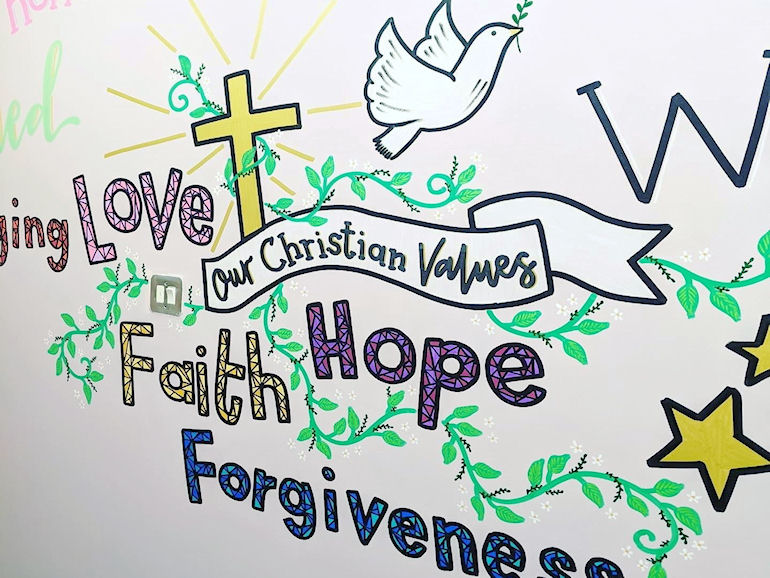
Our Values
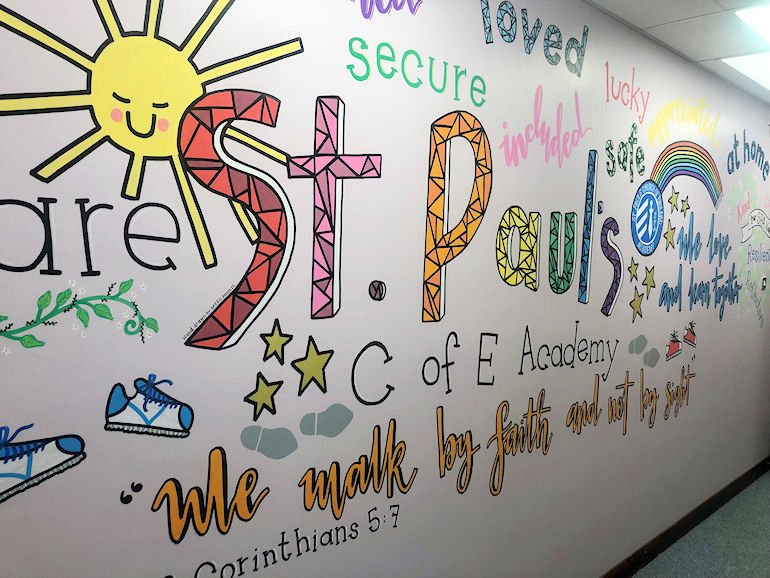
Vision and Values Wall
British Values
British Values are promoted through the Christian Values of at St. Paul’s.
Democracy
We actively promote and model democracy at St. Paul’s by:
- Ensuring that our children develop knowledge of, and respect for, public institutions and services, eg. visits to/from Police, Fire Service.
- Teaching our children how they can influence decision making through the democratic process through class voting, assemblies and activities during times of elections (local/general).
- Encouraging pupils to become involved in decision making processes and ensuring they are listened to in school, through the School Council, an ‘open door policy’ for the Principal and Senior staff, as well as liaison between staff and pupils.
- Teaching children how public services operate and how they are held to account, e.g. through annual theme weeks.
- Demonstrating how injustice can be peacefully challenged, eg. through the examples of the Gospels, by teaching about inspirational figures such as Mandela and Martin Luther King.
The Rule of Law
We actively promote and model the rule of law by:
- Ensuring school rules are clear and fair, eg. through our consistent Behaviour policy.
- Helping children to distinguish right from wrong, eg. by using the example of Christ when dealing with behaviour that is not acceptable.
- Promoting respect for the law and the basis on which it is made, eg. through visitors such as PCSOs, Police, and MP into school.
- Helping children to understand that living under the rule of law protects individuals, eg. through our RE curriculum, through theme weeks and visitors.
- Having a behaviour policy that is linked to restorative justice, eg. that is based in the Christian value of forgiveness.
Individual Liberty
We actively promote and model individual liberty by:
- Encouraging and supporting pupils in developing their self-knowledge, self-esteem and self-confidence through our Christian ethos, our way of treating people, investing in meeting the needs of all children, providing equality of opportunity, and understanding the needs of all children.
- Encouraging pupils to take responsibility for their behaviour as well as knowing their rights, through linking rights with responsibilities and having a fair and consistent Behaviour policy.
- Challenging stereotypes with welcoming visitors into school to talk about disability awareness, anti-racism and a high profile anti–bullying week.
- Implementing a strong anti-bullying culture.
Respect and Tolerance
We actively promote and model respect and tolerance by:
- Promoting respect for individual differences through our Christian ethos and RE curriculum and also through Worship and Assemblies, and RE theme days.
- Helping children to understand and respect their own and other cultures and ways of life, through RE, Geography, International Links.
- Discussing and celebrating the differences between people such as differences of faith, ethnicity, disability, gender and different family situations such as being a looked after child or a young carer.
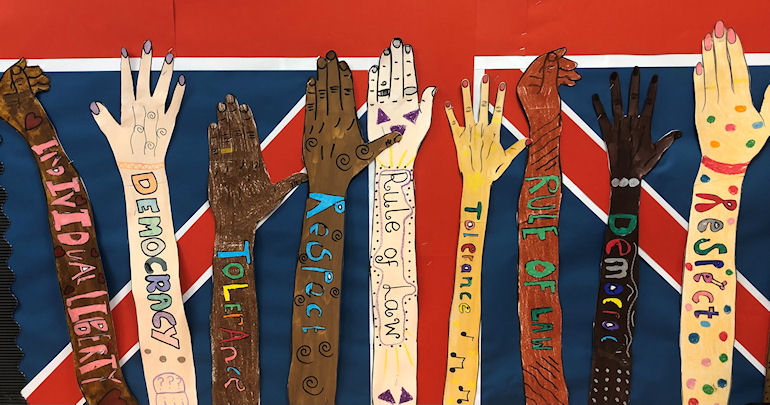
The British Values
